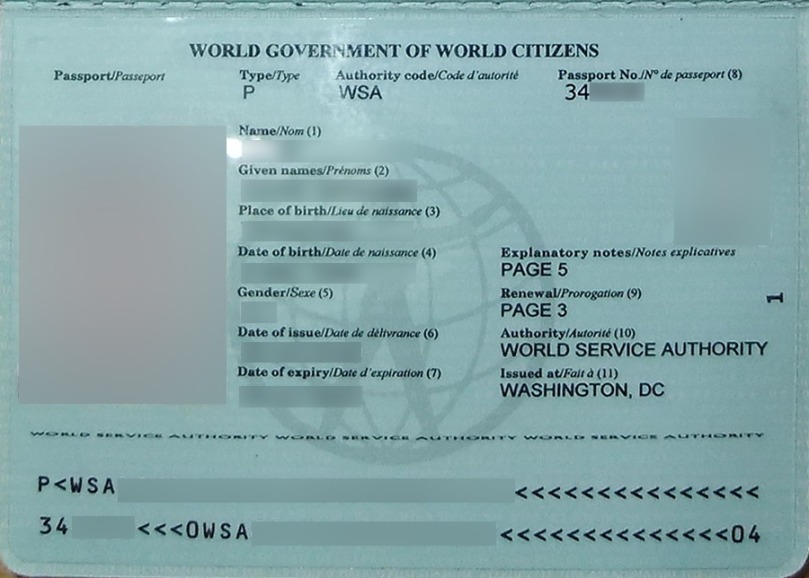By Johnny Sinodis
On January 14, 2016, the South African Department of Home Affairs arrested popular recording artist Yasiin Bey, aka “Mos Def,” after he attempted to board a flight with his family from Cape Town to Addis Ababa, Ethiopia, with a “World Government of World Citizens” passport. Bey returns to court on May 31 to contest allegations that he used a false identity, presented an unlawful document, and aided and abetted his family to stay in South Africa illegally.
“I lived in Brooklyn for 33 years of my life. I thought I’d be buried in that place,” Bey told Rolling Stone in 2013. “For a guy like me, who had five or six generations not just in America but in one town in America, to leave America, things gotta be not so good with America.” Three years following his relocation to South Africa, Bey finds himself in the midst of a contentious legal battle that could result in indefinite immigration limbo for the hip-hop artist and his family.
The circumstances surrounding Bey’s use of the so-called “World Passport,” rather than his U.S. passport, remain unclear. The Fourteenth Amendment of the Constitution of the United States of America guarantees that all individuals born within the United States are considered U.S. citizens. With limited exceptions, a U.S. citizen’s protected interest in his or her passport affords unrestricted access to the most prized identity and travel document in the world.

What many do not realize is that there are a variety of ways, both voluntary and involuntary, in which a U.S. born citizen’s right to obtain a U.S. passport may be abrogated. 8 U.S.C. § 1481 outlines seven acts that, if committed “with the intention of relinquishing United States nationality,” could result in the loss of citizenship. Causes for revocation include obtaining naturalization in a foreign state, taking an oath of allegiance in another country, committing an act of treason, or engaging in a conspiracy “to overthrow, put down, or to destroy by force the Government of the United States.” For example, on October 24, 2013, soul legend Tina Turner formally signed a “Statement of Voluntary Relinquishment of U.S. Citizenship under Section 349(a)(1) of the Immigration and Nationality Act,” in order to quit paying taxes in the United States after almost two decades of residence in Switzerland. Edward J. Snowden, the Hawaii-based computer specialist and NSA contractor-turned-whistleblower, also had his passport revoked by the U.S. Department of State on June 22, 2013, after he leaked classified documents detailing NSA’s surveillance operations.
So, what the what is going on with Bey, exactly? There are two possible explanations. The first is that Bey has refused to use his U.S. passport for political reasons. The performer has spoken out against the mass incarceration of black youth and police brutality in black neighborhoods in the United States. His attorney, Bernard H. Jackson, suggested that Bey “is uncomfortable that the majority of the population is willing to justify the murder of unarmed black youths by law enforcement agencies.” Bey also protested the force-feeding of detainees partaking in hunger strikes at the U.S. military detention facility in Guantanamo Bay, Cuba. He even appeared in a widely circulated video that graphically depicted the gruesome struggle of a detainee being force-fed. The second possibility is that the U.S. government suspended his passport in retaliation for the performer’s outspokenness despite his First Amendment right to free speech.
Bey’s immigration troubles began in May 2014, when various media outlets reported that his North American summer tour had been cancelled due to ongoing “immigration and legal issues.” It appeared that U.S. authorities had prevented the singer from entering the country. However, Bey managed to perform for Dave Chapelle’s comedy tour at Radio City Music Hall on June 27, 2014, stirring rumors that the comedian, allegedly a member of the Illuminati (yes you read that correctly), had secured a one-time special exception for the performer to return to U.S. soil. Reports of Yasiin Bey’s immigration case fell silent for the next year-and-a-half, leading many to conclude that whatever issues had forced the cancellation of his 2014 summer tour had been resolved. Then came his arrest in South Africa last January.

Mkuseli Apleni, the Director-General for the South African Department of Home Affairs, reported that Bey attempted to leave South Africa by using the World Passport as opposed to his U.S. passport, “with which he had initially entered the Republic.” Apleni added, “Immigration officers had also detected that his spouse and minor child had overstayed their visit to the Republic [given that] their visitor’s visas had expired in April 2014, and were therefore in the country illegally.” Bey and his family were detained and subsequently released on $300 bail with reporting requirements pending resolution of “charges for contravening the Immigration Act, 13 of 2002.”
South African officials claim that the World Passport is not a recognized travel document because its issuing body, the “World Government of World Citizens” or “World Service Authority,” is not part of the United Nations, the United Nations High Commissioner for Refugees, the African Union, the South African Development Community, or the African Development Bank. However, since the World Government of World Citizens‘ founding in 1953, 186 countries, including South Africa, have accepted the organization’s “World Passport.” The World Government of World Citizens maintains that its mission is consistent with the “global rights and duties of world citizens” as outlined by the 1948 UN Universal Declaration of Human Rights and the Stockholm Declaration of 1972.
The World Government of World Citizens is a Washington D.C.-based non-profit organization that originated in response to the disenfranchisement and dislocation of tens of millions of people during the postwar period. The vast majority of refugees lacked the necessary valid and authentic travel documents and thus became “stateless.” According to its website, “[t]he [World Service Authority’s] passport differs from national passports [by identifying] the bearer as a human being rather than as a national subject.” Refugees from Southeast Asia, Eastern Europe, and Eastern Africa have benefited from use of the World Passport for the better half of a century. To date, there are “over 1,000,000” registered world citizens.
In an interview with Beats by Dre recorded before his arrest, Bey discussed his departure from the United States and declared, “My country is called earth.” This declaration, as well as his repeated use of the World Passport, places the hip-hop icon in a very precarious position. Bey’s legal team has suggested that U.S. authorities have taken special interest in the South African dispute and are participating in the litigation.
Although Bey has not been convicted of any of the charges related to his January arrest, he will not be permitted to remain in South Africa. Most countries deport offenders to their homeland for presenting false immigration documents. To do so, the deportee’s country of origin must issue a valid travel document. Should the U.S. Department of Justice seek to revoke Bey’s U.S. passport and citizenship, he, like many World Passport holders, could become stateless. Where Bey will go remains anyone’s guess.

A review of U.S. passport revocation case law underscores the facile legal standard the DOJ must meet to win its case against Bey. The prevailing “preponderance of the evidence” standard is far lower than the “beyond a reasonable doubt” standard that the general public is accustomed to hearing. Alarmingly, like most other civil lawsuits, a judge need only find it is ‘more likely than not’ that Bey intended to renounce his U.S. citizenship before it vanishes for good.
If this all smells Orwellian, that’s because it is. The repercussions that accompany the termination of an individual’s citizenship are severe. And while the World Service Authority’s President, David Gallup, backed Bey’s case in a pointed letter to the South African Department of Home Affairs, the reality is that the World Passport is only rarely accepted as a valid document.
“I have made no false claims. I have not misrepresented myself. I’m under unnecessary state supervision,” Bey maintains. “I have reason to believe, or suspect, that there are political motivations behind the way that I am being treated. This is following no reasonable strain of logic, and it’s also…curious. I haven’t broken any law. And I’m being treated like a criminal.”
Whether or not Bey became the target of a conspiracy remains uncertain.Still, the innuendo is clear. Few should be surprised if Bey’s politics have rankled influentials in the Department of Justice. His struggle has likely only begun.
Johnny Sinodis is an immigration attorney in Phoenix, Arizona.

